Lesson15
- 格式:ppt
- 大小:3.78 MB
- 文档页数:12
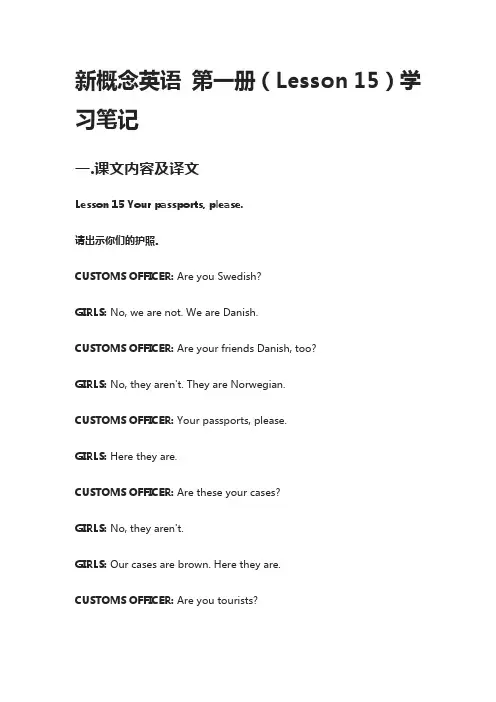
新概念英语第一册(Lesson 15)学习笔记一.课文内容及译文Lesson 15 Your passports, please.请出示你们的护照。
CUSTOMS OFFICER: Are you Swedish?GIRLS: No, we are not. We are Danish.CUSTOMS OFFICER: Are your friends Danish, too?GIRLS: No, they aren't. They are Norwegian.CUSTOMS OFFICER: Your passports, please.GIRLS: Here they are.CUSTOMS OFFICER: Are these your cases?GIRLS: No, they aren't.GIRLS: Our cases are brown. Here they are.CUSTOMS OFFICER: Are you tourists?GIRLS: Yes, we are.CUSTOMS OFFICER: Are your friends tourists too? GIRLS: Yes, they are.CUSTOMS OFFICER: That's fine.GIRLS: Thank you very much.参考译文海关官员:你们是瑞典人吗?姑娘们:不,我们不是瑞典人。
我们是丹麦人。
海关官员:你们的朋友也是丹麦人吗?姑娘们:不,他们不是丹麦人。
他们是挪威人。
海关官员:请出示们的护照。
姑娘们:给您。
海关官员:这些是你们的箱子吗?姑娘们:不,不是。
姑娘们:我们的箱子是棕色的。
在这儿呢。
海关官员:你们是来旅游的吗?姑娘们:是的,我们是来旅游的。
海关官员:你们的朋友也是来旅游的吗?姑娘们:是的,他们也是。
海关官员:好了。
姑娘们:非常感谢。
二.单词及短语customs n. 海关officer n. 官员girl n. 女孩,姑娘Danish adj.& n. 丹麦人friend n. 朋友Norwegian adj.& n. 挪威人passport n. 护照brown adj. 棕色的tourist n. 旅游者三.课文解析1.Are you Swedish?一般疑问句,倒装形式,be动词提前,声调朗读。
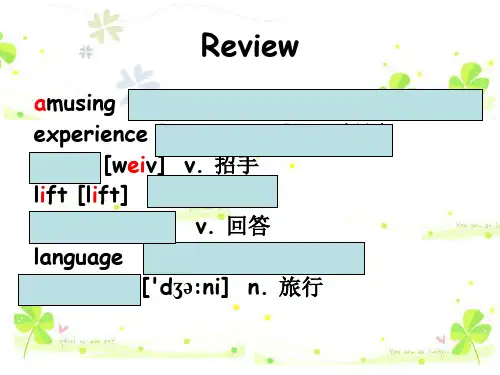
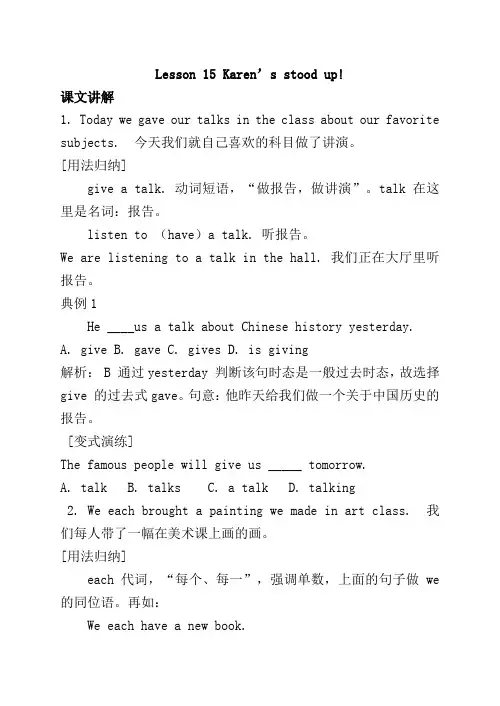
Lesson 15 Karen’s stood up!课文讲解1. Today we gave our talks in the class about our favorite subjects. 今天我们就自己喜欢的科目做了讲演。
[用法归纳]give a talk. 动词短语,“做报告,做讲演”。
talk 在这里是名词:报告。
listen to (have)a talk. 听报告。
We are listening to a talk in the hall. 我们正在大厅里听报告。
典例1He ____us a talk about Chinese history yesterday. A. give B. gave C. gives D. is giving解析: B 通过yesterday 判断该句时态是一般过去时态,故选择give 的过去式gave。
句意:他昨天给我们做一个关于中国历史的报告。
[变式演练]The famous people will give us _____ tomorrow.A. talkB. talksC. a talkD. talking2. We each brought a painting we made in art class. 我们每人带了一幅在美术课上画的画。
[用法归纳]each代词,“每个、每一”,强调单数,上面的句子做we 的同位语。
再如:We each have a new book.我们每人都有新书。
each作代词时常做主语,动词用单数形式,例如:Each of them likes reading a lot.他们每个人都喜欢读书。
典例2_______ of us comes from U.S.A.A. EveryB. EachC. BothD. All解析: B every 意思是每个,但它后面不加of 短语,排除;both 两者都……,all (三者或三者以上)都,后面不跟动词的第三人称单数形式,排除。
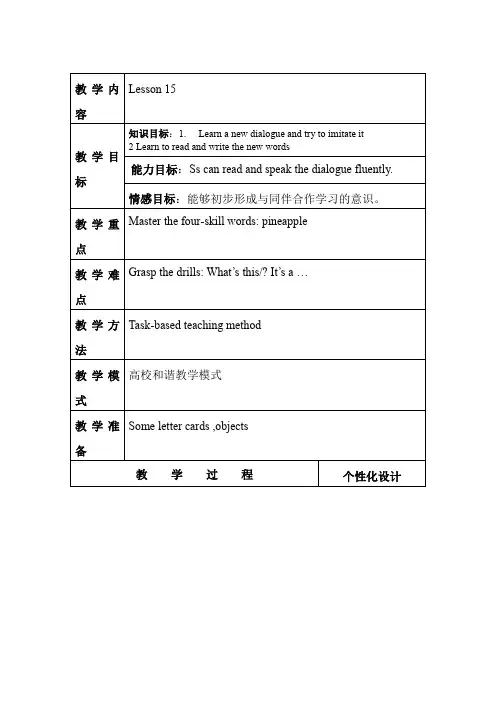
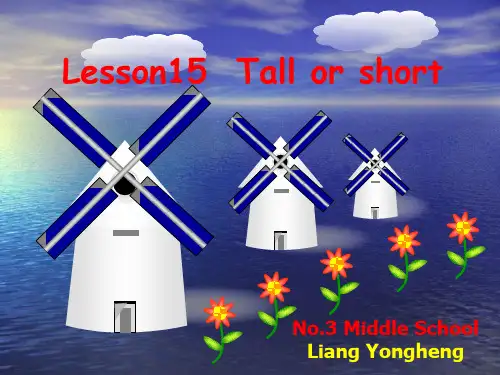
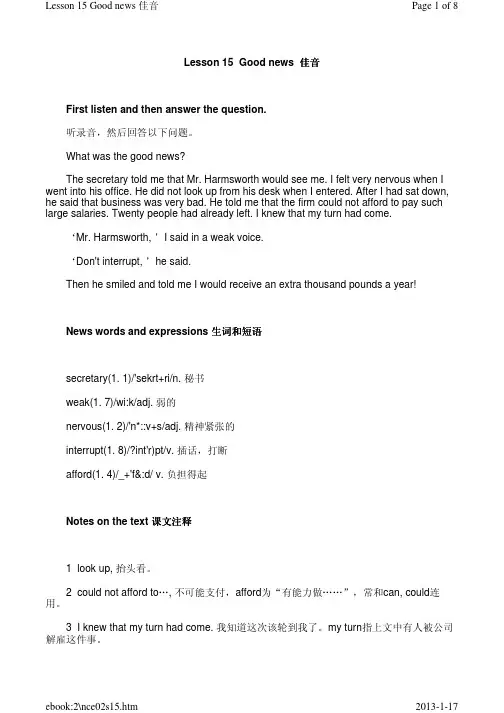
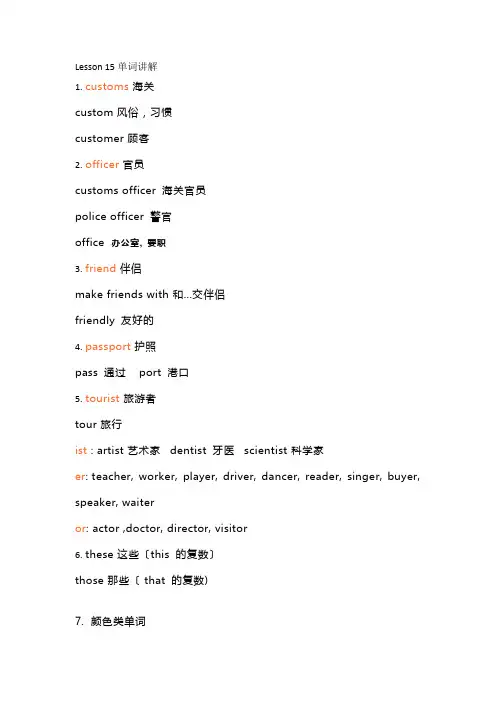
Lesson 15单词讲解1.customs海关custom 风俗,习惯customer 顾客2.officer官员customs officer 海关官员police officer 警官office 办公室, 要职3.friend伴侣make friends with 和...交伴侣friendly 友好的4.passport护照pass 通过 port 港口5.tourist旅游者tour 旅行ist : artist 艺术家dentist 牙医scientist 科学家er: teacher, worker, player, driver, dancer, reader, singer, buyer, speaker, waiteror: actor ,doctor, director, visitor6.these 这些〔this 的复数〕those 那些〔 that 的复数)7. 颜色类单词colour 颜色 red 红色 yellow 黄色 black 黑色 orange 橘黄色的brown 棕色的white 白色 pink 粉红色purple 紫色 blue 蓝色 green 绿色grey 灰色的8.国家和国籍类单词语言点讲解1. Your passports, please. 请出示你们的护照。
n.〔名词〕+please 结构1〕点餐时A roast duck, please. 请给我一只烤鸭。
Coffee ,please. 请给我一杯咖啡。
2). 购物时This Tshirt , please.3). 进站时Your ID card, please. 请出示你的身份证。
其他:Your name, please. 请告知我你的名字。
Your ticket ,please. 请出示你的票。
2. Here they are . 给您。
Here it is. 给你〔指单数的物〕Here they are. 给你〔指复数的物〕3. Are these your cases? 这些是你们的箱子吗?变成单数为:Is this your case? 这是你的箱子吗?句子单复数互变,关乎整个句子,而非一个单词。
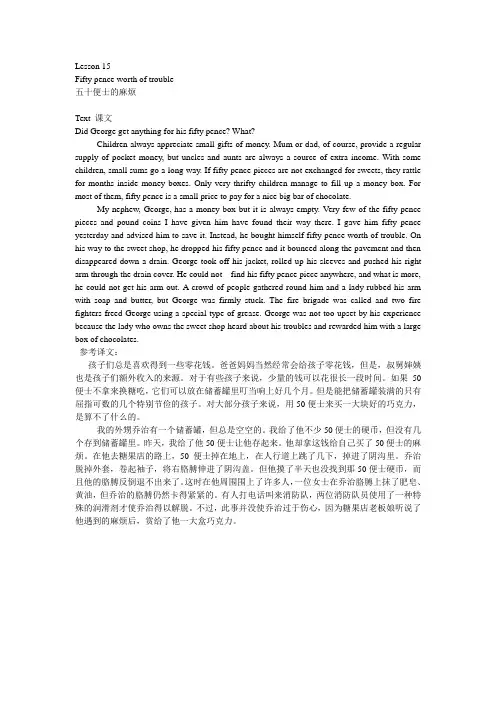
Lesson 15Fifty pence worth of trouble五十便士的麻烦Text 课文Did George get anything for his fifty pence? What?Children always appreciate small gifts of money. Mum or dad, of course, provide a regular supply of pocket money, but uncles and aunts are always a source of extra income. With some children, small sums go a long way. If fifty pence pieces are not exchanged for sweets, they rattle for months inside money boxes. Only very thrifty children manage to fill up a money box. For most of them, fifty pence is a small price to pay for a nice big bar of chocolate.My nephew, George, has a money box but it is always empty. Very few of the fifty pence pieces and pound coins I have given him have found their way there. I gave him fifty pence yesterday and advised him to save it. Instead, he bought himself fifty pence worth of trouble. On his way to the sweet shop, he dropped his fifty pence and it bounced along the pavement and then disappeared down a drain. George took off his jacket, rolled up his sleeves and pushed his right arm through the drain cover. He could not find his fifty pence piece anywhere, and what is more, he could not get his arm out. A crowd of people gathered round him and a lady rubbed his arm with soap and butter, but George was firmly stuck. The fire brigade was called and two fire fighters freed George using a special type of grease. George was not too upset by his experience because the lady who owns the sweet shop heard about his troubles and rewarded him with a large box of chocolates.参考译文:孩子们总是喜欢得到一些零花钱。
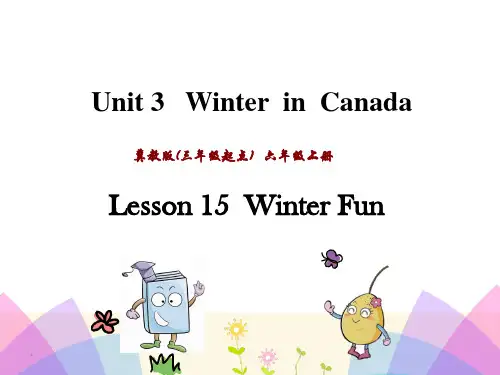
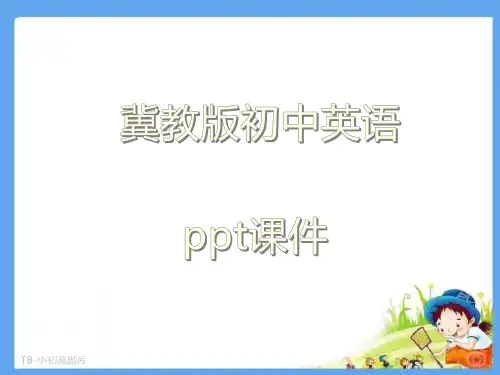
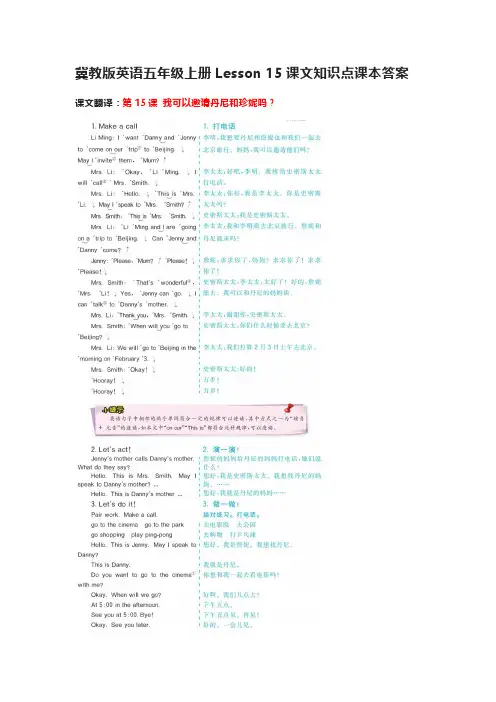
冀教版英语五年级上册Lesson 15课文知识点课本答案课文翻译:第15课我可以邀请丹尼和珍妮吗?重点讲解:重点句型:1. Hello. This is Mrs. Li. May I speak to Mrs. Smith? 你好,我是李太太。
你是史密斯太太吗?详解:此句是打电话的日常交际用语,首先自我介绍要用“This is+ 人名.”这是打电话的固定用语,切记不可用“I’m+ 人名.”接着用“May I speak to …?”来询问是否可以和某人通电话。
句型结构:This is …May I speak to …?如:Hello , this is Li Ping. May I speak to Tom? 您好,我是李萍。
我想找汤姆。
2.Li Ming and I are going on a trip to Beijing. 我和李明将去北京旅行。
详解:此句是描述某人将来计划或打算要做某事的句型。
句型结构: …+is/are going to+ 动词原形+ 其他.如:She is going to go to Shanghai. 她打算去上海。
They are going to see the animals. 他们打算去看动物。
3.When will you go to Beijing? 你们将什么时候去北京?详解:此句是询问将来某个活动安排的具体时间的常见句型,回答时可直接回答具体的时刻,也可用“It’s+ 具体时刻.”。
句型结构:—When + will …+ 动词原形+ 其他? —It’s+ 具体时刻.如: —When will he come here? 他什么时候要来这里?—At 10:00 tomorrow morning. 明天上午十点。
4.See you at 5:00.五点见。
详解:此句是与对方约好将来某个时间见面的句型。
句型结构:See you at + 具体时刻.如:See you at nine this morning. 今天上午九点见。
六年级上册英语说课稿-Lesson 15 Winter Fun-冀教版一、教材分析1.1 教学内容本课是六年级上册英语第十五课。
本节课将学生带入冬天的世界,了解冬季的一些相关知识,并通过课文的学习和运用自己的想象力,让学生感受冬季的快乐。
1.2 教学目标1.学生能够听懂、会说本课的单词和短语,并能正确地运用它们。
2.学生能够读懂本课的文章,并理解文章中的意思。
3.学生能够运用文章中的语言材料描述冬季的活动。
4.学生能够提高自己的口语表达能力。
1.3 教学重点1.重点单词和短语的学习和运用。
2.重点句型的学习和使用。
1.4 教学难点1.学生能够正确地描述并介绍冬季活动。
2.学生能够主动地运用语言材料进行口语表达。
二、教学过程2.1 创设情境首先,以“winter”为主题,放一些冬季活动的图片,让学生感受到冬天的气息,并向学生引入本节课的主题。
2.2 呈现新词为了让学生更好地明白本节课的内容,我将一些重点单词及短语展示在课堂上,并用图片和语音来辅助教学。
【板书设计】Winter funskateskisnowsnowmansled【过渡】Ask: Do you like winter? Why or why not?2.3 学生阅读课文将课文逐一分段展示给学生阅读,要求学生根据上下文理解文章中的意思,并读出其中关键单词和长难句。
然后向学生提问:What do people do in winter?2.4 重点难点讲解在学生理解文章之后,重点讲解一些难以理解的单词和短语,尤其是一些容易混淆的单词,确保学生理解正确。
如:•skate和ski的区别•snow和snowman的区别2.5 听音练习让学生听教师播放的录音,跟着录音朗读,并在语音、发音、语调上纠正学生的错误并指导学生朗读正确的内容。
2.6 表达练习利用图片或教师提供的情景,让学生进行口语表达练习,能够自如地运用本节课的语言材料进行相关的口语表达。
【中文注释】五年级上册英语课文lesson 15
现在小学英语的教学,并不给学生教授单词的音标,也不针翻译单词的具体意思,只是让学生知道课文中语句、对话的大概意思。
这样的结果是,孩子们可能看着课文会读,离开课本就基本上什么都不知道了。
因此,将课本(北京出版社)中的语句按照单词、语句每个都翻译,让孩子在朗读的时候就知道每个单词、每个句子的准确意思,明明白白地学习,十分有意义。
这样,笔者将英语课文进行了逐词、逐句的翻译,供有需要的家长和孩子们使用。
祝你们在英语学习上能更进步。
1
Lesson 15 Where are you from?
2。